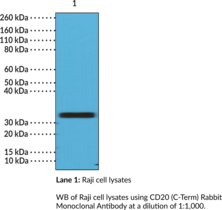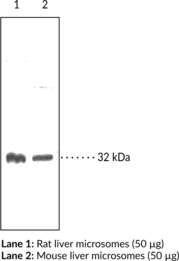Description
CD20 is a non-glycosylated protein encoded by MS4A1 in humans.{59585} It is comprised of four transmembrane domains, a single intracellular loop, and two extracellular loop domains with both the N and C-termini located in the cytosol. CD20 is a general B cell marker that is expressed from the late pre-B lymphocyte stage but is not expressed by pro-B lymphocytes and is lost in terminally differentiated plasma cells and plasmablasts. It forms supramolecular complexes with CD53, CD81, and CD82, as well as MHCII, CD40, B cell receptors, and C-terminal Src kinase-binding protein (CBP) to contribute to signal transduction. MS4A1 expression is variable in B cell malignancies, with the lowest expression found in patients with chronic lymphocytic leukemia (CLL) and the highest expression found in patients with diffuse large B cell lymphoma (DLBCL) or hairy cell lymphomas. MS4A1 expression is enriched on IFN-γ-inducible T-box transcription factor-expressing B cells in blood isolated from patients with multiple sclerosis.{59586} Cayman’s CD20 (C-Term) Rabbit Monoclonal Antibody can be used for immunohistochemistry (IHC) and Western blot (WB) applications.
Synonyms: B-lymphocyte Cell-surface Antigen B1|Membrane-spanning 4-domains Subfamily A Member 1
Immunogen: Peptide from the C-terminal region of human CD20
Formulation: 100 µl protein A-purified monoclonal antibody
Isotype: IgG
Applications: IHC, WB
Origin:
Stability: 365 days
Application|Immunohistochemistry||Application|Western Blot||Product Type|Antibodies|Monoclonal Antibodies||Research Area|Cancer||Research Area|Immunology & Inflammation|Adaptive Immunity||Research Area|Immunology & Inflammation|Autoimmunity||Research Area|Neuroscience


